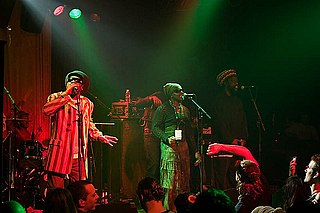Top Qs
Timeline
Chat
Perspective
Grammy Award for Best Reggae Album
Honor presented to recording artists for quality reggae albums From Wikipedia, the free encyclopedia
Remove ads
The Grammy Award for Best Reggae Album is an award presented at the Grammy Awards for quality works in the reggae genre. Originally called the Grammy Award for Best Reggae Recording, the honor was presented to artists for eligible songs or albums. The Jamaican group Black Uhuru received the first award in 1985. Beginning with the 1992 ceremony, the name of the award was changed to Best Reggae Album. Starting in 2002, awards were often presented to the engineers, mixers, and/or producers in addition to the performing artists. According to the category description guide for the 52nd Grammy Awards, eligible works are vocal or instrumental reggae albums "containing at least 51% playing time of newly recorded music", including roots reggae, dancehall and ska music.[1]
At the 62nd Annual Grammy Awards in 2020, Koffee became the youngest person and the first woman to win the award. Ziggy Marley holds the record for the most wins in this category, with seven wins as of 2017. The current recipient of the award is the Bob Marley film soundtrack One Love.
Remove ads
Recipients











^[I] Each year is linked to the article about the Grammy Awards held that year.
Remove ads
2010 controversy
Summarize
Perspective

Buju Banton's (real name Mark Anthony Myrie) nomination for the 2010 award sparked controversy and protest due to homophobic lyrics within his music.[40][41] Banton's most controversial song, released in 1988, is "Boom, Bye Bye", which "promote[s] the murder of gay men by shooting or burning".[42] Following the artist's nomination, the Gay & Lesbian Alliance Against Defamation and the Los Angeles Gay and Lesbian Center placed an advertisement in the Daily Variety encouraging Grammy officials to denounce music that "promotes or celebrates violence against any group of people".[40] The advertisement, which took the form of a letter signed by gay rights and civil rights activists, asserted that honoring Banton was awarding "extraordinary hateful work". The National Academy of Recording Arts and Sciences responded by insisting that artists are honored for quality music "regardless of politics". Banton has been quoted as saying that he sees "no end to the war" between himself and gay men.[40][43] The 2010 award was presented to Stephen Marley. Banton was nominated in 2011 for the album Before the Dawn.[28] Other reggae musicians that have been accused of promoting anti-gay lyrics include Beenie Man, Elephant Man, Shabba Ranks and Sizzla.[44][45]
Remove ads
See also
References
Wikiwand - on
Seamless Wikipedia browsing. On steroids.
Remove ads